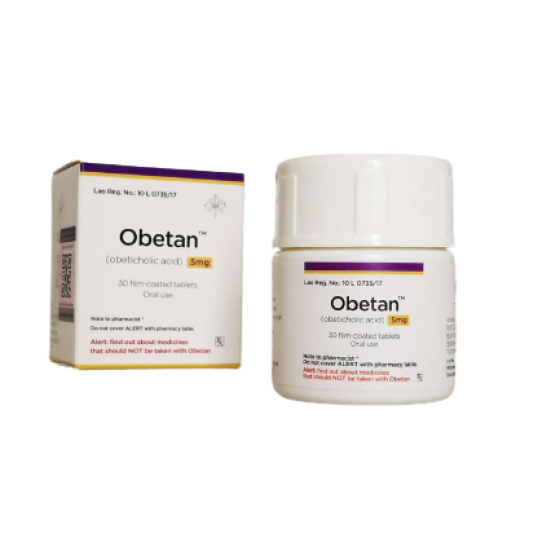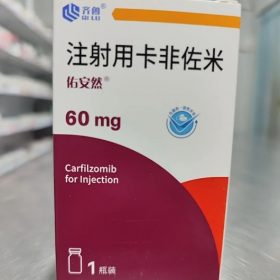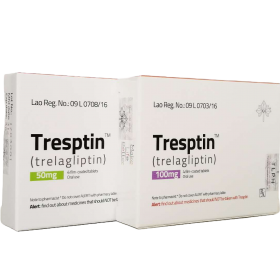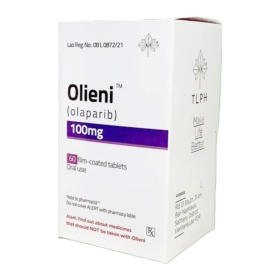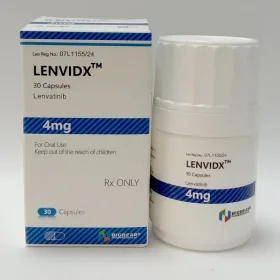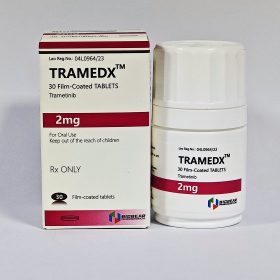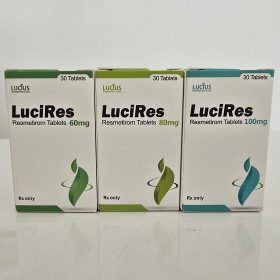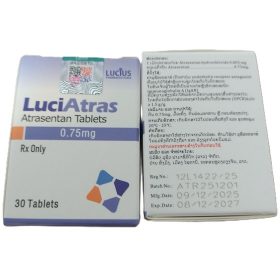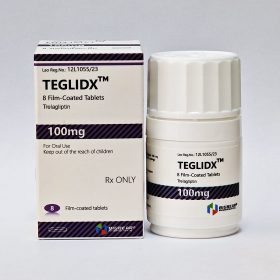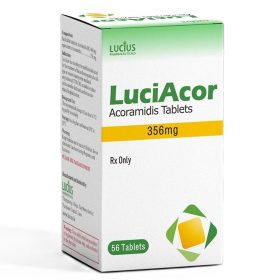- Details
- Description
-
Packaging Size5mg*30Tablets
-
Strength5mg
-
CompositonObeticholic acid
-
TreatmentPrimary biliary cholangitis
-
FormTablet
-
BrandObetan
-
Quantity Unit30Tablets/Bottle
-
ManufacturerTongmeng (Lao) Pharmaceutical & Food Co., Ltd.(TLPH)
Indications
Orbetan is a farnesol X receptor (FXR) agonist. Orbetan combined with ursodeoxycholic acid
(Ursodeoxycholicacid, UDCA) Used for primary biliary bile ducts with insufficient response to UDCA
Inflammatory (previously known as primary biliary cirrhosis, PBC) in adult patients, or as a monotherapy for
Adult patients with primary biliary cholangitis intolerant to UDCA.
Dose and administration method
- Method of administration
- Recommended dose (TDC): 24 mg orally, once a day.
- Recommended dose (RCC): 5mg everolimus + 18mg Levinib, orally, once a day. Follow Follow medication guidelines.
- For patients with DTC and RCC, the dose can be adjusted.
- In patients with severe renal or hepatic impairment, the dose of DTC is 14 mg once a day, and the dose of RCC is The dose is 10 mg once a day.
- Dosage specifications
- Capsules, 5mg.
- Contraindications: None.
Warnings and Precautions
- Hypertension: Before treatment with Levigne, blood pressure needs to be controlled. Even if the patient has the best resistance to high Blood pressure therapy, but Levigny is not recommended for patients with grade 3 hypertension. For patients with life-threatening hypertension In those cases, stop the medication.
- Heart failure: Closely monitor the clinical symptoms and signs of cardiac decompensation during medication. For 3 Lavigne is not recommended for patients with grade new dysfunction. For patients with grade 4 cardiac insufficiency, stop medication.
- Arterial thromboembolic events: After an arterial thromboembolic event, Levigny should be terminated.
- Hepatotoxicity: Before the start of Levigne treatment and throughout the treatment, regularly monitor liver function. For level 3 and
(Please read this notice carefully and take the medicine according to this notice or under the guidance of a doctor)
- Lavigne is not recommended for patients with liver impairment above. For patients with liver failure, stop medication.
- Proteinuria: Before the start of Levigne treatment and throughout the treatment, regularly monitor proteinuria. For 24 hours
- Lavigne is not recommended for patients with urinary protein ≥ 2 g. For patients with nephrotic syndrome, stop medication.
- Diarrhea: can cause severe or recurring diarrhea. Use standard anti-diarrheal treatment. For level 3 and above
- Lavigne is not recommended for patients with diarrhea.
- Renal failure and renal impairment: Lavigne is not recommended for patients with grade 3 or 4 renal failure/impairment.
- Gastrointestinal perforation and fistula formation: in patients with gastrointestinal perforation or life-threatening fistula, stop Levigny.
- Prolonged QT interval: All patients should monitor and correct electrolyte abnormalities. For occurrence of grade 3 or greater Lavigne is not recommended for patients with prolonged QT events.
- Hypocalcemia: Monitor blood calcium levels at least once a month, and supplement calcium when needed. Reversible posterior leukoencephalopathy syndrome (RPLS): During RPLS, Lavigne is not recommended until RPLS complete relief.
- Bleeding events: Levigny is not recommended for grade 3 bleeding events. For grade 4 bleeding events, stop medication.
- Thyroid stimulating hormone (TSH) inhibition/abnormal thyroid function: monitor TSH levels monthly, And use thyroid replacement medicine as needed.
- Embryo-fetal toxicity: may cause harm to the fetus. Advise the fetus of potential risks and use effective contraception.
Adverse reactions
In DTC, the most common adverse reactions of Levigne (incidence greater than or equal to 30%) are hypertension,
Fatigue, diarrhea, joint pain/myalgia, loss of appetite, weight loss, nausea, stomatitis, headache, vomiting,
Proteinuria, palmar-foot-plantar erythema syndrome, abdominal pain, and dysphonia.
In RCC, the most common adverse reactions (greater than 30%) of Levinib+everolimus are diarrhea, fatigue,
Joint pain/myalgia, loss of appetite, vomiting, nausea, stomatitis/oral inflammation, high blood pressure, peripheral edema,
Cough, abdominal pain, difficulty breathing, skin rash, weight loss, bleeding episodes, and proteinuria.
Storage method
Store at room temperature of 25°C (77°F), and allow to take out to 15-30°C (59-86°F).

